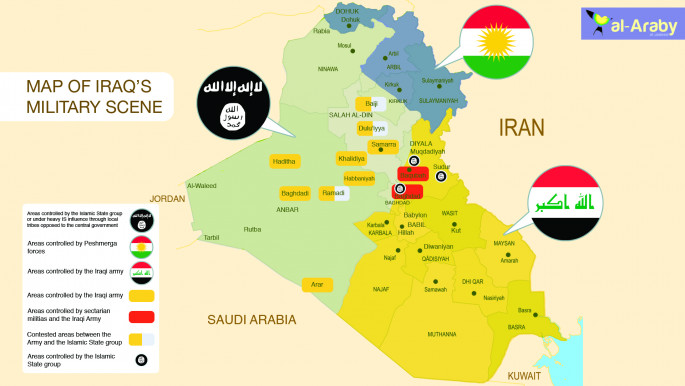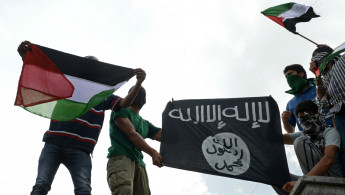Pacts made with blood: the global brand of IS
Dealing with the Islamic State group appears akin to treating a terminally ill patient.
When cancerous cells are removed from one part of the body, another tumour appears elsewhere. With renewed aggression and hunger, it eats away at the body.
IS is an impossible monster to predict. Its military juggernaut has slowed down in parts of Syria and Iraq, only for new affiliates to appear in other parts of the world.
Around 35 groups - from Mali to the Philippines - have pledged their support or allegiance to IS' leadership, according to intelligence gathering website IntelCentre.
Although not all have carried out violent attacks, it highlights a worrying fact that the IS brand of terror is going global.
It also means that popular uprisings or anger could be hijacked by these franchises - as they were in Syria and Iraq.
It is impossible to predict what might happen with a global network of small, empowered bands of fighters that are part of the IS umbrella group.
What we do know is that IS military tactics have been to use the art of deception to defeat much larger forces.
Small mobile forces using speed, heavy firepower, suicide bombings and propaganda spread confusion and terror in the enemy ranks.
| IS groups everywhere appear intent in outdoing one another in the gore factor. |
They have also built on the ideas of jihadi theorist Abu Bakr Naji on how to use and spread chaos to help attract recruits and supporters.
We have seen this time and again in Syria and Iraq.
Global brand
Before the Islamic State group's lightning capture of Mosul in northern Iraq in June 2014, it had set up a complex intelligence system for its agents to infiltrate Syrian opposition groups.
Christoph Reuter's Der Spiegel investigation into how IS embedded former intelligence and military officers into the Syrian opposition showed that rebel groups were completely taken by surprise by the move.
In Egypt, the local IS franchise has taken a similar path of penetrating areas with thin government control, to launch devastating attacks amid the chaos of authoritarian rule with mass opposition.
In the rocky outcrops on the Sinai, an IS-affiliated group emerged, which is becoming one of the most effective branches of the terror group's brand.
Ansar Beit al-Maqdis launched spectacular attacks on Egyptian army guard posts in July, which killed more than 100 soldiers. Many more have been died since.
Not all IS affiliates have the capabilities to launch such devastating attacks, but many seem to share the blood lust that has come to define the group in Iraq and Syria.
Ansar al-Sharia's beheading of 21 Coptic Egyptians on the Libyan coast - along with the later killing of other hostages from Ethiopia - was a gruesome statement of loyalty to IS.
IS groups appear intent in outdoing one another in the gore factor.
Boko Haram, a group famous for the mass murder and abductions of whole villages, pledged allegiance to IS leader Abu Bakr al-Baghdadi in May.
It could be just a matter of time before other smaller IS affiliates begin to launch similar assaults in their territories.
Blood lust
IS brand strategy optimises how the global media will respond to its barbaric and shocking slaughter of prisoners. Yet it also ensures that it uses propaganda to paint an idyllic image of the "caliphate".
Just as al-Qaeda was able to monopolise on the anger of young Muslims across the world from the killings in Iraq after 2003, IS has been able to exploit the suffering in Syria.
But both groups are also skillful manipulators and have predicted the responses of the Arab world's most ruthless regimes to power challenges.
 |
| [Click to enlarge] |
Management of Savagery set out a brutal blueprint on how lawlessness - in civil wars, for example - could be used by jihadi groups to extend their influence.
Amid the death and destruction of Yemen's civil war, IS has found a foothold.
Frank Gardner of the BBC explained last week how IS and al-Qaeda had entered Yemen's southern city of Aden, under control of Gulf forces, southern separatists and soldiers loyal to President Rabbo Mansour al-Hadi.
If the turmoil in Yemen continues then we could see IS extending its influence there.
More bloody, more brutal
Inside Syria, IS momentum has slowed, and tactics have changed to ensure that the guerilla movement is difficult to predict.
After months of setbacks in Hassakeh and Ain al-Issa, the group has launched surprise attacks in Kobane, and most recently, in Damascus.
These shock attacks have been effective in giving IS the appearance of invincibility, when in reality the group has been undermined by coalition air raids and renewed Kurdish resistance.
IS attacks are not usually attempts to capture territory, but more like bloody and brutal raids to sap morale from the enemy and give the impression that the group still poses a serious threat.
The group now appears to be preparing to attack the Druze-majority area of Sweida.
The group has also taken advantage of an al-Nusra Front withdrawal from Aleppo province to go on the offensive.
Rebel forces in Marea village have reportedly been hit with mustard gas by IS artillery in the past week.
It is obvious that the only way to deal with the group's worldwide brand is to look at the root of the problem. This ultimately means looking at how we deal with the Assad regime.
Reports suggest that Assad helped create the conditions that have allowed IS to expand its influence in Syria and keep itself busy with fighting a protracted war with Kurdish and rebel militias.
As one Syrian army soldier reportedly said, amid the street battles between IS and rebel fighters: "[I am] very happy that they are fighting."
IS militants were just a stone's throw from Assad's palace, when this comment was made, which would indicate that the group's strength in Damascus is limited.
However, the solution to the global threat of IS is a local one and only if the conditions that give rise to the extremists can be tackled - corruption, authoritarianism and inequality - can the growth of IS be ended.



